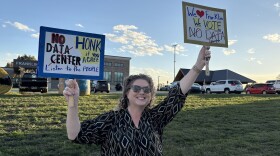Democratic state Rep. Lindsey Burke of Lexington filed a trio of bills Wednesday to support abortion access and maternal mental health care.
The bills would repeal basically all abortion restrictions implemented in Kentucky since 2015, formalize protections for people who seek abortion out-of-state, and give resources to families about maternal and postpartum depression.
The three proposals
House Bill 428, dubbed the “North Star bill,” would repeal the state’s near-total abortion ban as well as other restrictions on abortion the Kentucky Legislature has passed since 2015.
House Bill 429, nicknamed the “shield bill,” would provide a range of legal protections when a Kentuckian seeks an abortion in a state where that’s still legal. Among other things, the proposal would:
- Protect anyone involved in arranging for or obtaining the abortion, including health care providers, from civil or criminal liability in Kentucky.
- Shield medical records and other documents related to the abortion from disclosure for the purpose of “investigating, tracking or attempting to identify” anyone involved.
- Prohibit public agencies from enforcing policies that may impede or retaliate against someone traveling across state lines to get a legal abortion or anyone who assists that person.
- Allow people to file a civil lawsuit for damages if the protections they’re granted under this bill are violated.
“It's not fair that someone should be forced into a horrible situation, make an impossible decision, and then have to live with the fear of being criminalized, attacked, doxxed … for the rest of their lives,” Burke said at a news conference Wednesday. “And the shield bill is how we can protect other Kentuckians.”
Burke said the federal HIPAA law already provides a lot of protections for patient records, but she sees her proposal as a bid to formalize such rights and to give people a new avenue for a lawsuit if their records are wrongfully accessed.
She added that the shield bill isn’t based on template legislation, and that it’s “unique to Kentucky.”
Burke also indicated the bill is, in part, a direct response to when former Attorney General Daniel Cameron and other Republican attorneys general publicly argued they should be able to access medical data for residents who get abortions in other states.
The final proposal Burke introduced Wednesday is House Bill 430. It would require Kentucky’s Health Access Nurturing Development Services program, or HANDS, to give participating families information on maternal and postpartum depression.
The Kentucky Legislature’s Republican supermajority won’t vote to repeal the anti-abortion laws it passed in prior years. And Burke’s shield bill is a long shot.
But HB 430 could garner bipartisan momentum. A priority proposal for the GOP-led House, known as House Bill 10 or the “Momnibus bill,” also aims to improve maternal health care and would expand other aspects of the HANDS program.
Burke shares her difficult journey to motherhood to underscore need for these bills
When Burke announced the new legislation Wednesday, she spoke about her own experiences to emphasize the complexities of pregnancy and why she’s working for more access to reproductive health care, including abortion.
“I want to start today by sharing a very, very personal set of stories,” she said as she stood alongside other women, in front of a row of TV cameras. “Normally at a press conference like this, we would bring in individuals from the community to tell their stories. But as a legislator who is working on these issues, I think it's important for me to be transparent with the world.”
Burke said she was raped as a teenager.
“Fortunately, I was infertile and that rape did not lead to a child. But I wonder what would have happened if that had been my story,” she said.
Burke went on to describe the hardships she experienced with her husband, more than a decade later, as they pursued parenthood through a series of fertility treatments — medical care they took out a loan of over $50,000 to afford.
Burke said they saw a specialist in Cincinnati because Kentucky has limited access to doctors capable of providing such services, even in Lexington, where she lives.
She described experiencing a missed miscarriage in 2020, when her body physically did not recognize she had lost her pregnancy. To treat that condition, she underwent a surgical procedure that’s also used for abortions.
When she later became pregnant with twins, Burke described the horror of learning that one of her children had fatal fetal anomalies.
“Any one of them was like a one in 100,000 chance,” she said. “But unfortunately, my baby had three. That’s like [a] ‘one-in-10-million’ type chance, a perfect embryo that developed wrongly.”
She and her husband made the hard choice to go out-of-state for a “selective reduction” abortion in order to protect the life of their other child.
“I loved all three of those children, and I still do,” she said Wednesday.
“So when we talk about reproductive health care access in Kentucky, this is a more critical issue than people realize,” Burke said. “This is about women and people who want to be mothers, who desperately want to experience being a parent, who don't have access to the care that they need. …
“We have eliminated access that used to exist, and we didn't have enough to start with. And then we cut it down to nothing. This must be fixed.”






